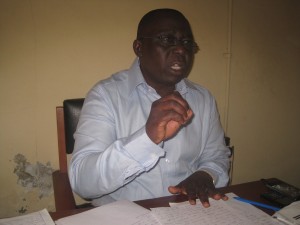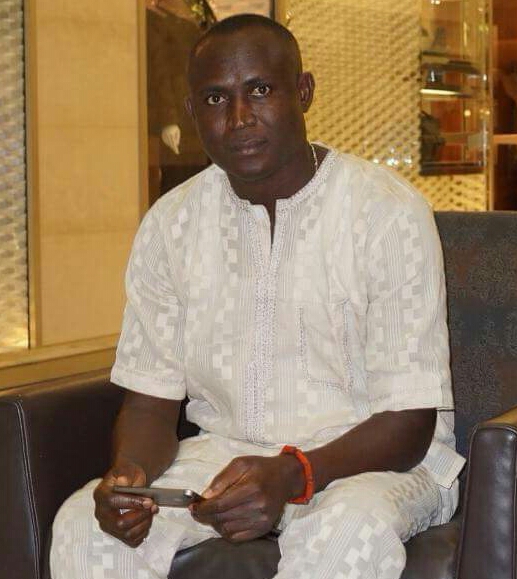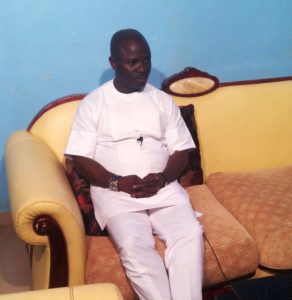Technocrats In Public Sectors Have Failed Us – Gbemre
Mr. Paul K. Gbemre is the Managing Director of SDP Manufacturing Limited, (Producers of Aquadel Table Water). In this interview with our crew of Tejiri Ebikeme and Frank Efe, the Warri based businessman speaks on unemployment rate, poverty, technology and manpower, NDDC and other boiling issues in Nigeria. Excerpt.
May we meet you briefly?
My name is Paul Gbemre. I am the Managing Director of SDP Manufacturing Ltd, producers of Aquadel Table Water. I am also the Chief Executive of EM-RE Co. Nig, a waste management company. I hold a bachelor degree in Chemistry from the University of Ibadan and graduated in 1979. I started out with Delta Steel Company Ltd, Ovwian Aladja in October1980 as one of the pioneer staff in the Research and Quality Control Sector and exited voluntarily in 1992 as an Assistant Chief Chemist to pursue other personal yearnings. I relocated to Lagos where I started my private business.
I went into supply of chemicals, cleaning services, fumigation and pest control and later into the supply of technical tools and Industrial gases with the Flour Mill, Apapa as my major client. In 2000, I joined Dangote Industries as the first Production Manager to pioneer the Pasta Factory in Ikorodu. Together with the erection staff we built the mega plant and by end of 2001, production had begun. I managed the production department with a total staff strength of 283 and a plant capacity of 300 tons per day (300 tons of spaghetti macaroni).
Today the pasta plant has built on the foundation we laid to over 500 tons per day and a flour mill of 800 tons/day capacity. In 2004 Valleumbra Flour Mills, Aba engaged my services to build a Pasta plant. At the end of 2007 I had delivered, operated and managed a vibrant and functional Pasta Factory. Again I still felt the need to expand my horizon. Early 2008, Delta State Integrated Development Projects, (IDP) under Gary Akpobire contacted me to provide framework and documentation for the establishment of a Pasta Plant and Flourmill in Delta State. I saw it as recognition of my experience and journey so far and as a way to contribute to the development of the State having been away for 16 years.
By 2009, I had delivered on my assignment during which time I invited the Italians and Turkish counterparts with whom I have collaborated over the years in the area of flour milling and Pasta production, to meetings with IDP representatives. We had two of such meetings in Lagos. I had also, in the company of IDP officials visited locations in Delta State to recommend a suitable site for this mega Industry that would have provided employment directly or indirectly for over 4000 persons.
Unfortunately all these efforts came to naught. Sad indeed that to date there has been no further development on this issue.
How do we get it right in relation to your IDP experience?
I feel relieved when I heard that a panel has been set up to look into the activities of IDP. I do hope that the panel will address all of those issues and come up with a better way forward.
Can you describe the Economic climate in relation to the unemployment rate in Nigeria?
One of the indices of measuring the state of an economy is the rate of unemployment. Statistics show today that unemployment in Nigeria is very high, therefore there is still a lot more to be done if we must get it right.
Youths, especially graduates find it very difficult to get jobs, in variably; their parents take care of them instead of the other way round. How do you react to these issues as a consultant?
My reaction to this question is a two way approach. As a result of high unemployment rate in Nigeria, what has happened is that the graduates who have nothing to do fall back on their parents who barely survive from petty trading and menial jobs? But this should not be so if a large percentage of the unemployed youths are proactive and innovative in their approach to life. They can think of engaging in some productive venture. I know that the challenges will be tough but with perseverance and diligence, they will overcome in the long run. For instance, in the water production industry, there is room for the unemployed to earn a living in the area of supply of packaging materials. We use packing bags, sachet nylon, shrink wraps but water producers do not manufacture these materials. The people who make these materials are far from the water factories. I know a lot of graduates who have done a lot for themselves by going on to bring these materials to the doorsteps of water factories. If you do this every day, I tell you, you will not need to look for a job.
On the other hand, it is true that government has no business in the management of Industry. But providing infrastructure for industrial development will attract investors to set up industries, thereby creating jobs. For example, government should facilitate programmes that will enhance peace and security in the region, there should be regular power supply to reduce cost of production and the roads should be made accessible.
These have taken too long to come. Competent manpower is also crucial to the growth of the economy. I believe we have the manpower but the qualified and skilled personnel are not properly utilised.
The world is fast developing between technology and manpower, which more important?
These two are integral components of a developing economy. However, I consider manpower ahead of technology, because it is the manpower that brings about technological development. Adequate training, conducive environment and proper motivation of skilled personnel will facilitate technological growth.
What do you think is the reason for failure in the public sector?
The technocrats in the public sector may have failed us. They are considered as the drivers of the engine in the Public Sector but what has happened is that they have abdicated their duties to the politicians, many of whom are ill-equipped for the job.
How do we eradicate poverty from the country, particularly in the Niger Delta region where majority of the people are suffering in the midst of plenty?
In the Niger Delta, specifically I will recommend that we reduce over dependence on oil, revert back to our traditional means of livelihood and improve on them, for example, those on land should go back to farming and improve on it, people living on water should revert back to fishing and improve on it. The success story of China today was predicated on this.
Do you think that NDDC has lived up to expectation of the people of the Niger Delta region?
I do not want to be in a hurry to castigate the NDDC because one needs to know whether the Agency is adequately funded by the Federal Government and their oil counterparts. However, from what I see on the ground I believe the expectations of the people of the Niger Delta are yet to be met. It is a fact that we hardly see projects that touch the lives of the common man, other than road construction by the NDDC.
What is the way forward for the rapid industrialization of the Niger Delta region?
Encourage entrepreneurship, reduce dependence on oil, facilitate projects that are people friendly, allow core professionals manage these projects and shun tribalism. These are key things we must do to bring about industrialization in the Niger Delta area.
What will be your road map for the NDDC?
NDDC should go back to its master plan and review aspects that have become obsolete or no longer in tune with current trend and implement with all sincerity.
Comment on the development of Delta State, almost 22 years after its creation?
You are aware that we have had two types of government in the last 22 years. We had the military and now we experience some level of democracy. There may not be basis to compare development under the two dispensations. However, I know that we have had more development under the democratic system than we had in the military. My take here is that so far so good. But we still have to put all hands on deck to do more for Delta State.
What do you think went wrong with DSC and how can we get there?
Here again is where I say Government has no hand in running companies. This project was one failed project from inception because the Federal Government never let go one day.
When you see the state of the Delta Steel Company, how do you feel from your heart of heart?
My heart bleeds because as young graduates at that time, many of us were excited and ready to give our best, but as time went on and we saw the signs of frustration and failure, the zeal began to wane. Situations where people who were less qualified were appointed to sensitive positions because they came from some sections of the country became rampant. Also approval to procure major raw materials was never on time. Things like this and many more will collapse mega factories within a short time. If you have to resort to travel always to Abuja to make some decisions and get approval for certain items to keep the Plant running, then you have killed that business because it will cost you more to reactivate the machines if they shut down. It all boils down to bureaucracy of Government. Private individuals should run the plant. This way, decision making is quicker, the right manpower is employed, good results are obtained and adequate return on investment is guaranteed for the stakeholders. Imagine the benefit of over 2000 skilled labour to Delta State, the Federal Government and the Country at large if D.S.C.were still alive today.
What is your final word?
I call on Deltans to stand for what is right always. Shun corruption and strive to do good all the time.




